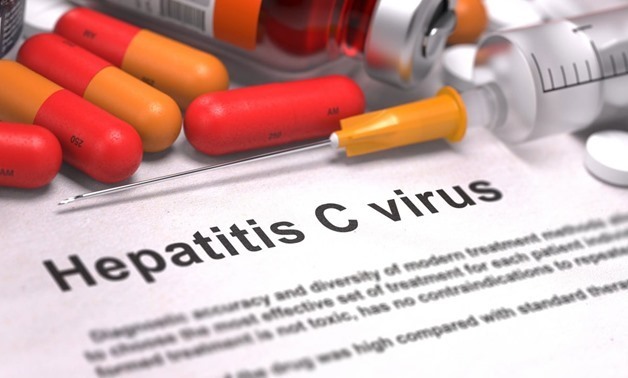
FILE - Two million citizens infected with HCV virus have already been treated, Ministry of Health announce in December 2017
CAIRO – 7 March 2018: Since the launch of the national anti-HCV program in 2014, 1.4 million citizens infected with hepatitis C virus (HCV) been treated, and the government is still looking for 1.5 million more to be fully cured during 2018.
By the year of 2022, Egypt will be HCV-free, announced Yehiya el-Shazly, president of the National Committee for Fighting Hepatitis C Virus (HCV) Infections, about a year ago.
The epidemic prevalence of HIV boils down to the use of improperly discharged syringe needles during state-led campaigns launched in the 1960s and 1970s against bilharzia.
Under the directives of President Abdel Fatah al-Sisi, the Health Ministry announced a comprehensive strategy to eliminate HCV after infection rates were at their highest in Egypt by 2014, according to the World Health Organization, which cited that HCV kills 400,000 Egyptians a year.
Challenges remain:
Infection rates increase by around 150,000 every year, says Gamal Esmat, a professor of hepatology and endemic medicine and member of the National Committee for Liver Disease Control. He attributed such increase to the lack of awareness among Egypt’s population, as most patients are usually unaware that they carry the virus, outward symptoms of which can materialize long after infection occurs.
“We are working on three aspects. First is about offering intensive walk-in campaigns in all governorates. Secondly, there are nation-wide medical centers, labs and NGOs helping citizens figure out whether or not they carry the hepatitis C virus. The third aspect is prompting workers and staff at every workplace across Egypt to get the test,” Esmat stated.
He further illustrated that HCV tends to spread by blood-to-blood contact through shared toothbrushes or equipment used in hair salons and barber shops, like razors, confirming that HCV can rarely be transmitted through direct sexual activities and that infections caused by that reason account for only two percent.
The campaign’s 1st and 2nd phases:
In late February, the Ministry of Health announced the launch of hepatitis C field inspections in the remaining 10 governorates under the ministry’s nation-wide initiative to eliminate the spread of HCV by 2020.
Last week, the ministry announced that 17 governorates have been targeted by the ministry’s walk-in HCV testing.
During a meeting on Thursday, Minister of Health Ahmed Emad el-Din discussed with the ministry’s leaders the progress made thus far in the campaign and the cluster of medical conveys in the new target governorates.
The minister also announced that 79,400 citizens have already been tested by 56 medical convoys during the first phase in 17 governorates.
He also confirmed that remaining governorates include Qalyubia, Kafr el-Sheikh, Alexandria, Matrouh, Ismailia, Suez, South and North Sinai, and New Valley, explaining that there will be 31 walk-in points established and distributed to thoroughly cover the said governorates, along with a total 124 mobile medical vehicles for testing opportunities.
The medical examinations are conducted through the analysis of ELISA screening for hepatitis C using dried blood samples; those found to be HCV-positive are immediately directed to undergo the medical treatment program offered by the ministry that only costs LE 1,500 ($85).
Shazly announced in February 2017 that the ministry was providing alterative treatment courses for 45,000 patients reinfected with the virus.
As for medications, Egyptian pharmaceutical company Pharco managed to develop a new sofosbuvir-based treatment to flush out HCV, which was tested and found to be safe and successful.
International momentum gained:
Argentinean footballer Lionel Messi, during his tour to Egypt last February, prompted the state’s nation-wide campaign against HCV as under the health tourism campaign launched by the Egyptian government called “Tour n' Cure.”
Messi praised Egypt as “the leading example in fighting HCV.”
“Medication against hepatitis C saves lives; let's put an end to the waiting lists,” read a caption of an Instagram picture of Messi at the Pyramids.
“It’s such a success story. The whole thing is something the Egyptians can be really proud of,” said Tim Coleman, an English documentary filmmaker who was fully cured from HCV after taking part in the government’s “Tour and Cure” program.
Director General of the World Health Organization Tedros Adhanom on Tuesday, February 27 hailed the major efforts and achievements realized by Egypt in its wide-scale campaign to fight hepatitis C.
Brazilian footballer Roberto Carlos accompanied the medical convoy sent out to Cairo’s largest slum, Ezbet el-Hagana, to spread awareness about hepatitis C and conduct inspections.
In press remarks, Carlos said that he loves being in Egypt and that his current visit will not be the last, extending his thanks to the Egyptian leadership for its efforts to end the spread of hepatitis C.


Comments
Leave a Comment